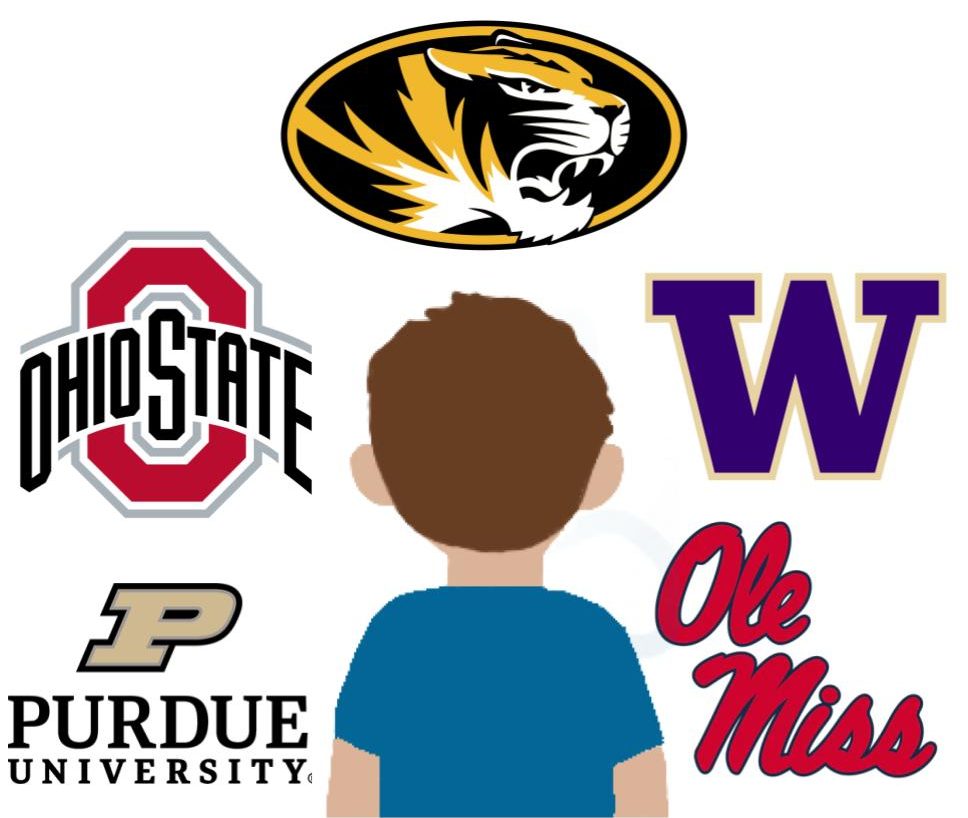Soft skills
A different skillset may share class time with content knowledge
School: Algebra homework, vocabulary quizzes, chemistry tests, timed writes.
Work: angry customers, unhelpful coworkers, indifferent managers.
“As of right now, I don’t feel prepared for the workplace at all,” Joel Frederickson (10) said. “I’m only a sophomore, so I haven’t even had my first job yet. I have leadership status in school, since I’m a drum major in the marching band. I’m harsher on myself than I should be.”
What students learn in school isn’t always the same skillset that is required for success in the workplace. For this reason, the Sept .11 faculty meeting included a business panel consisting of four local professionals who discussed the skills that employers look for and how teachers can work with their students to better prepare the next generation of employees for the workplace.
- Brad Carlson, associate professor in the School of Business at St. Louis University.
- Aaron Jackson, cloud consultant at World Wide Technology.
- Kim Plank, general manager of CIC St. Louis.
- Gayle Reneer, vice president of Virtual Health Care at Mercy Hospital.
Although extracurriculars may provide a network of relationships and leadership opportunities, the educational and academic aspects of high school often take priority over other types of training, especially soft skills training.
“The hardest part of being a drum major is getting the band to listen to you,” Frederickson said. “It’s hard to lead a third of the band and to be responsible for over 100 band members who are watching you.”
Working with other people and leadership are some of the most crucial elements to working in a business environment. These skillsets fall under the category of soft skills.
“Soft skills are things like teamwork and punctuality and communication, and all the things that aren’t necessarily taught in a curriculum,” Jeff Buckman, college admissions specialist, said.
These skills are multifaceted and often have to do with a person’s ability to manage themselves–not just the way they interact with others. The key to successfully managing other people is having strong self-management skills.
“Most focus soft skills on people skills – how effective we are in working with others,” Lei Han, a Stanford engineer and Wharton MBA wrote in a post about soft skills. “This is absolutely important. However, what you must also master to accelerate success are self-management skills.”
Students who work part-time or have work experience outside of high school can testify to the importance of self-management and people skills in the workplace.
“The hardest part of my job is that there’s a lot going on and it’s stressful,” Jack Vandegriffe, Wildwood Family YMCA Childwatch attendant, said. “Sometimes there are crying babies or not enough workers. There’s a lot I have to deal with, and I have to be able to do it all at one time.”
Self-management and interpersonal skills are necessary to a business environment. These skills are also useful in a school setting, where even students who do not have jobs can learn how to succeed in the workplace.
“Some aspects of my education have prepared me, but–to some degree–it’s more my interactions with my teachers,” Sarah Landgraf (12) said. “The personal side of getting ready for classes and staying on top of things like homework and extracurriculars have also prepared me for working in the future.”
Academics require perseverance, organization and communications skills as students success depends on their preparedness for class and interactions with teachers; all of which lend to the development of soft skills.
“Soft skills cannot be taught in a vacuum nor can they be acquired simply because the goal of a lesson plan indicates it shall be so,” The U.S. Department of Labor, Office of Disability Employment Policy said in a study.
The fact that soft skills training requires more than just a checklist or specific curriculum means that the academic environment does not always lend itself to the development of employment skills.
“There’s not a lot of room to take classes that solely focus on the soft skills and not the hard content,” Buckman said. “Soft skills are what employers are looking for.”
Teachers may struggle to incorporate soft skills practice in their classrooms because the traditional view of education centers around academics alone. However, the development of soft skills is key in students’ abilities to get a jobs after high school or college.
“Sometimes it’s hard because there’s certain content that I have to present and teach,” Mary Wisdom, Math, said. “With my Algebra 2 classes that’s especially difficult.”
Preparing students for their future by incorporating soft skills training into the classroom is essential to their success after high school.
“When employers do hire from college, the evidence suggests that academic skills are not their primary concern,” Peter Cappelli said in his paper Skill Gaps, Skill Shortages and Skill Mismatches: Evidence for the US. “Work experience is the crucial attribute that employers want even for students who have yet to work full-time.”
Incorporating soft skills training into the classroom includes anything from working as a collaborative team in a group project to creating a project innovatively and on an individual basis.
“The ultimate goal for students is not a diploma,” Carlson said when speaking to the faculty, Sept. 11. “The ultimate goal is employment.”
The chances of employment depend on the soft skills that a candidate has.
A 2016 survey performed by the National Association of Colleges and Employers reported that “Leadership, the ability to work in a team, written communication skills, problem-solving skills, verbal communication skills, strong work ethic, initiative, and analytical/quantitative skills, flexibility/adaptability” are the top nine attributes that employers seek on a candidate’s resume. In tenth place on this list is “technical skills.”
The business people who spoke to the faculty echoed this, Sept. 11.
This list demonstrates that employers are seeking candidates that have refined their soft skills above those who are technically skilled and traditionally trained in academics alone.
“It used to be about the hard skills,” Buckman said. “If you knew the content, that led to the job.These days, it’s easy to get content because of technology.”
Information is more readily available to employees because of developments in modern technology such as smartphones and the internet. Employers are looking for hires that are adaptable, creative and communicate well as opposed to those who can memorize information.
Teachers can work with their students to create an educational environment that fosters life skills as well as academics by implementing activities and projects that require problem solving, creativity and teamwork.
“Everybody is creative in some way.,” Mandy Kotraba, Science, said. “We have to find ways as teachers to draw that out of students said.”
But teachers aren’t the only agents of change in the classroom.
“Foster accountability and the value of compromise,” Plank said to the faculty, Sept. 11. “Lack of accountability not only hurts the individual, but also the team.”
Learning to work with other people and as a team is a key element of preparedness for a business environment. Fostering collaboration and teamwork into the classroom means implementing opportunities for students to work together in order to solve a problem or create a final product.
“Working on team-building activities to make sure you can work with other people will help you to be more prepared for the workplace because most of the time that’s what you’re going to be doing,” Emma Dill (11) said. “Having a positive attitude helps as well, so you’re not pulling yourself down.”
Problem solving and critical thinking exercises may be just as vital to students’ future success as graphing quadratic functions and knowing the difference between a gerund and a participle.
“We have to present students with problems that are difficult to solve because nobody gets things right on the first time,” Kotraba said. “We have to make it more common for students to fail and be okay with it.”
Allowing students to fail and learn how to succeed individually is paramount to their functionality as contributing members of society.
“Failing has helped me to work harder and to know what my strengths and weaknesses are,” Katelyn Muszalski (9) said. “If you fail in high school, it counts as learning and you’re better prepared than if you were to fail in the future.”
While feeling lost may seem contrary to the purpose of school, the act of making meaning–of trying and failing an trying again–is at the very heart of learning.
“It would save so much time and be so much easier to give students the answers,” Carlson said to the faculty, Sept. 11. “They need to find the answers. Students need to feel totally lost and totally confused to find the answer.”
By allowing students to find answers for themselves, educators are fostering creativity and independent thinking. Both of these attributes will make them more hireable and give them a sense of empowerment towards their future.
“Schools are meant to set you up for success, and if a school isn’t doing that, then it shouldn’t call itself a school,” Frederickson said, “A school’s philosophy is that they want to make you the greatest version of yourself that you can be.”
Unless schoolwork starts to incorporate these soft skills students may need to supplement their classes with on-the-job training.
“I do not feel very prepared for the business environment,” Dill said.”It’s a little scary just to be thrown into the workplace, but I’ll see how it goes.”
[wp_quiz id=”41960″]
Your donation will support the student journalists of Eureka High School - MO. Your contribution will allow us to purchase equipment and cover our annual website hosting costs.

Miller is a reporter for the EHS-hub. She has been on staff since the first semester of her senior year, returning after taking Journalism, Writing, and...

This is Jack's seventh semester on the Digital Media Production staff. In his free time, he likes to film and edit videos. If he could use one word to...













